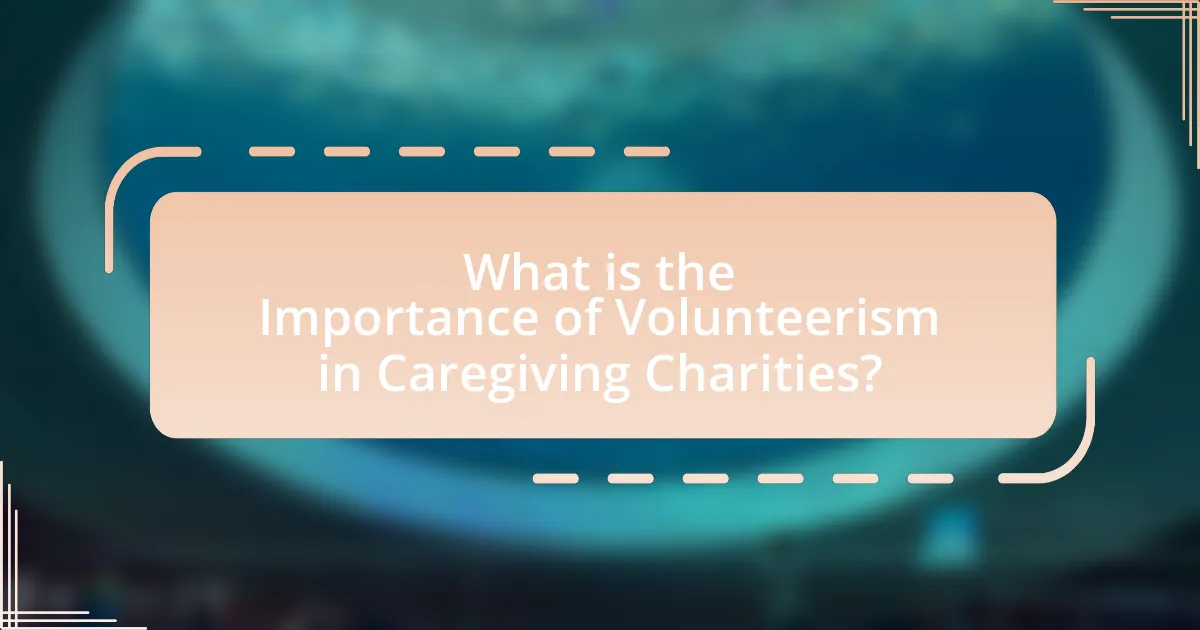Volunteerism plays a vital role in caregiving charities by providing essential support that enhances service delivery and community well-being. Volunteers contribute significant time and skills, alleviating the workload of paid staff and allowing organizations to serve more individuals effectively. The article outlines the importance of volunteerism, detailing the various roles volunteers play, the impact on community health, and the benefits for both caregivers and recipients. It also addresses challenges faced by caregiving charities in recruiting and retaining volunteers, and highlights best practices for fostering a supportive environment that encourages ongoing volunteer engagement.

What is the Importance of Volunteerism in Caregiving Charities?
Volunteerism is crucial in caregiving charities as it provides essential support and resources that enhance the quality of care for individuals in need. Volunteers contribute their time and skills, which helps to alleviate the workload of paid staff, allowing organizations to serve more clients effectively. According to a report by the Corporation for National and Community Service, volunteers in the United States contributed approximately 6.9 billion hours of service in 2017, valued at over $167 billion, demonstrating the significant impact of volunteer efforts on community health and well-being. This involvement not only enriches the lives of those receiving care but also fosters a sense of community and social responsibility among volunteers, creating a cycle of support that benefits both caregivers and recipients.
Why is volunteerism essential for caregiving charities?
Volunteerism is essential for caregiving charities because it provides the necessary manpower and resources to support their operations. Many caregiving charities rely heavily on volunteers to deliver services, as they often operate with limited budgets and cannot afford to hire sufficient staff. For instance, according to a report by the Corporation for National and Community Service, volunteers contribute an estimated $184 billion worth of services annually in the United States, significantly enhancing the capacity of these organizations to serve vulnerable populations. This volunteer support not only helps fulfill immediate caregiving needs but also fosters community engagement and awareness about caregiving issues, ultimately strengthening the charity’s impact.
What roles do volunteers play in caregiving charities?
Volunteers in caregiving charities primarily provide essential support services, enhancing the overall effectiveness of these organizations. They engage in various roles such as direct caregiving, administrative assistance, fundraising, and community outreach. For instance, volunteers often assist with tasks like meal preparation, companionship, and transportation for individuals in need, which directly contributes to the well-being of those served. According to a report by the Corporation for National and Community Service, volunteers in health-related charities significantly improve service delivery and client satisfaction, demonstrating their critical impact on caregiving efforts.
How does volunteerism enhance the services provided by caregiving charities?
Volunteerism enhances the services provided by caregiving charities by increasing the workforce available to deliver essential support and services. This influx of volunteers allows charities to expand their reach, serve more individuals in need, and provide a wider array of services, such as companionship, transportation, and assistance with daily activities. For instance, a study by the Corporation for National and Community Service found that volunteers contribute approximately 7.9 billion hours of service annually in the U.S., translating to an economic value of over $193 billion. This significant contribution underscores how volunteerism not only supplements the efforts of paid staff but also enriches the overall impact of caregiving charities on communities.
What impact does volunteerism have on the community?
Volunteerism significantly enhances community well-being by fostering social cohesion and addressing local needs. Engaging volunteers in caregiving charities leads to improved services for vulnerable populations, such as the elderly and low-income families. Research from the Corporation for National and Community Service indicates that communities with higher volunteer rates experience lower crime rates and improved public health outcomes. Additionally, volunteerism cultivates a sense of belonging and purpose among participants, which can lead to increased civic engagement and community pride.
How does volunteerism foster community engagement in caregiving?
Volunteerism fosters community engagement in caregiving by creating opportunities for individuals to connect and collaborate in support of shared goals. When volunteers participate in caregiving initiatives, they not only provide essential services but also build relationships with those they serve and with fellow volunteers, enhancing social cohesion. Research indicates that communities with active volunteer programs experience increased trust and cooperation among residents, which is crucial for effective caregiving. For instance, a study by the Corporation for National and Community Service found that volunteering leads to higher levels of civic engagement and community involvement, demonstrating the positive impact of volunteerism on community dynamics in caregiving contexts.
What are the long-term benefits of volunteerism for community health?
Volunteerism significantly enhances community health by fostering social connections, improving mental well-being, and increasing access to health resources. Engaging in volunteer activities promotes social cohesion, which has been linked to lower rates of depression and anxiety among participants. A study published in the Journal of Health and Social Behavior found that individuals who volunteer regularly report higher life satisfaction and better overall health outcomes. Additionally, volunteerism can lead to improved health literacy in communities, as volunteers often disseminate vital health information and resources, thereby empowering residents to make informed health decisions.

How does Volunteerism Benefit Caregiving Charities?
Volunteerism significantly benefits caregiving charities by providing essential manpower and resources that enhance service delivery. Volunteers contribute their time and skills, allowing charities to expand their reach and support to those in need. For instance, a study by the Corporation for National and Community Service found that volunteers contribute an estimated $184 billion annually to the U.S. economy, demonstrating the substantial impact of volunteer efforts on nonprofit organizations, including caregiving charities. Additionally, volunteers often bring diverse perspectives and expertise, which can lead to innovative solutions and improved program effectiveness.
What are the key advantages of having volunteers in caregiving charities?
The key advantages of having volunteers in caregiving charities include increased manpower, diverse skill sets, and enhanced community engagement. Volunteers provide essential support that allows charities to extend their services and reach more individuals in need. For instance, a study by the Corporation for National and Community Service found that volunteers contribute approximately $184 billion worth of services annually in the United States, demonstrating their significant impact on charitable organizations. Additionally, volunteers often bring unique skills and perspectives that can improve service delivery and innovation within caregiving charities. Their involvement fosters a sense of community, encouraging others to participate and support charitable efforts, which ultimately strengthens the overall mission of caregiving organizations.
How do volunteers contribute to the sustainability of caregiving charities?
Volunteers contribute to the sustainability of caregiving charities by providing essential services and support that reduce operational costs. Their involvement allows charities to allocate more resources toward direct caregiving efforts rather than administrative expenses. For instance, a study by the Corporation for National and Community Service found that volunteers contribute an estimated $184 billion annually to the U.S. economy, demonstrating the significant financial impact of volunteer work. Additionally, volunteers enhance community engagement and awareness, fostering a network of support that can lead to increased donations and resources for caregiving charities.
What skills do volunteers bring that enhance caregiving services?
Volunteers bring essential skills such as empathy, communication, and adaptability that significantly enhance caregiving services. Empathy allows volunteers to connect with patients on a personal level, improving emotional support and overall well-being. Effective communication skills enable volunteers to relay important information between caregivers and patients, ensuring clarity in care instructions and fostering trust. Adaptability is crucial in caregiving environments, as volunteers often encounter diverse situations and must adjust their approaches accordingly to meet the unique needs of each individual. These skills collectively contribute to a more compassionate and efficient caregiving experience, ultimately leading to better patient outcomes.
How does volunteerism affect the emotional well-being of caregivers and recipients?
Volunteerism positively affects the emotional well-being of both caregivers and recipients by fostering a sense of purpose and community connection. Caregivers often experience reduced stress and increased satisfaction from helping others, which can alleviate feelings of isolation and burnout. For recipients, engaging with volunteers can enhance feelings of worth and belonging, leading to improved mental health outcomes. Research indicates that caregivers who volunteer report higher levels of happiness and lower levels of depression, while recipients benefit from the social interactions and support provided by volunteers, which can lead to enhanced emotional resilience.
What psychological benefits do volunteers experience through their service?
Volunteers experience several psychological benefits through their service, including increased happiness, reduced stress, and enhanced self-esteem. Engaging in volunteer work fosters a sense of purpose and belonging, which contributes to overall emotional well-being. Research indicates that individuals who volunteer report higher levels of life satisfaction and lower rates of depression. A study published in the Journal of Happiness Studies found that volunteers experience a “helper’s high,” a term describing the euphoric feeling associated with helping others, which can lead to improved mental health outcomes. Additionally, volunteering can create social connections, reducing feelings of isolation and loneliness, further enhancing psychological resilience.
How does volunteerism improve the quality of care for recipients?
Volunteerism improves the quality of care for recipients by providing additional support and resources that enhance service delivery. Volunteers often bring diverse skills and perspectives, which can lead to more personalized and attentive care. For instance, a study published in the Journal of Health and Social Behavior found that organizations with active volunteer programs reported higher satisfaction rates among recipients, as volunteers often spend more time with individuals, fostering stronger relationships and better understanding of their needs. This increased interaction not only improves emotional well-being but also contributes to more effective care strategies tailored to individual circumstances.

What Challenges Do Caregiving Charities Face in Volunteerism?
Caregiving charities face significant challenges in volunteerism, primarily due to recruitment, retention, and training of volunteers. Recruitment is hindered by competition from other organizations and a lack of awareness about the charity’s mission. Retention issues arise from volunteer burnout, often caused by emotional strain and insufficient support. Training challenges stem from the need for specialized skills, which can deter potential volunteers. According to a study by the Corporation for National and Community Service, 63 million Americans volunteered in 2018, yet many organizations struggle to maintain consistent volunteer engagement, highlighting the systemic issues within caregiving charities.
What are common obstacles to recruiting and retaining volunteers?
Common obstacles to recruiting and retaining volunteers include lack of time, insufficient recognition, and unclear expectations. Many potential volunteers cite busy schedules as a primary reason for not participating, as they struggle to balance personal and professional commitments. Additionally, organizations often fail to adequately recognize and appreciate volunteers’ contributions, leading to decreased motivation and engagement. Furthermore, when roles and responsibilities are not clearly defined, volunteers may feel uncertain about their impact, which can result in frustration and eventual withdrawal from the organization. These factors collectively hinder the effectiveness of volunteer recruitment and retention efforts in caregiving charities.
How can caregiving charities overcome these recruitment challenges?
Caregiving charities can overcome recruitment challenges by implementing targeted outreach strategies and enhancing volunteer engagement programs. By utilizing social media platforms and community events, these organizations can effectively reach potential volunteers who are passionate about caregiving. Research indicates that 70% of volunteers are motivated by personal connections to the cause, highlighting the importance of storytelling and community involvement in recruitment efforts. Additionally, providing training and support can improve volunteer retention, as studies show that organizations with comprehensive onboarding processes retain 50% more volunteers.
What strategies can be implemented to retain volunteers effectively?
To retain volunteers effectively, organizations should implement strategies such as providing meaningful recognition, fostering a sense of community, and offering skill development opportunities. Recognition can include public acknowledgment of volunteers’ contributions, which has been shown to increase satisfaction and commitment. Creating a sense of community through team-building activities enhances relationships among volunteers, leading to higher retention rates. Additionally, offering training and development opportunities not only equips volunteers with new skills but also demonstrates the organization’s investment in their personal growth, which can significantly boost their motivation to stay engaged. Research indicates that organizations with strong volunteer retention strategies see a 50% increase in volunteer commitment over time.
How do caregiving charities ensure volunteer training and support?
Caregiving charities ensure volunteer training and support through structured onboarding programs and ongoing education. These organizations typically implement comprehensive training sessions that cover essential caregiving skills, safety protocols, and emotional support techniques. For instance, many charities utilize a combination of in-person workshops and online training modules to accommodate different learning styles and schedules. Additionally, they often provide mentorship opportunities, pairing new volunteers with experienced caregivers to foster skill development and confidence. Research indicates that organizations with robust training programs report higher volunteer retention rates, demonstrating the effectiveness of these initiatives in maintaining a committed volunteer workforce.
What training programs are essential for effective volunteer engagement?
Essential training programs for effective volunteer engagement include orientation training, skills development workshops, and ongoing support sessions. Orientation training familiarizes volunteers with the organization’s mission, values, and operational procedures, ensuring they understand their roles and responsibilities. Skills development workshops enhance specific competencies, such as communication, conflict resolution, and caregiving techniques, which are crucial in caregiving charities. Ongoing support sessions provide volunteers with continuous feedback and opportunities for personal growth, fostering a sense of community and commitment. Research indicates that organizations with structured training programs experience higher volunteer retention rates and satisfaction, underscoring the importance of these training initiatives in maximizing volunteer engagement.
How can caregiving charities provide ongoing support to volunteers?
Caregiving charities can provide ongoing support to volunteers by offering training programs, regular communication, and recognition initiatives. Training programs equip volunteers with necessary skills and knowledge, enhancing their effectiveness and confidence in caregiving roles. Regular communication, such as newsletters or meetings, keeps volunteers informed and engaged, fostering a sense of community and belonging. Recognition initiatives, including awards or appreciation events, acknowledge volunteers’ contributions, which can increase motivation and retention. Research indicates that organizations with strong volunteer support systems experience higher volunteer satisfaction and commitment, ultimately benefiting the charity’s mission and the communities they serve.
What best practices can enhance volunteerism in caregiving charities?
To enhance volunteerism in caregiving charities, organizations should implement structured onboarding processes, provide ongoing training, and foster a supportive community environment. Structured onboarding ensures that volunteers understand their roles and responsibilities, which increases retention rates; studies show that organizations with comprehensive training programs see a 50% increase in volunteer engagement. Ongoing training keeps volunteers informed about best practices and enhances their skills, leading to improved service delivery. Additionally, creating a supportive community through regular communication and recognition of volunteer efforts cultivates a sense of belonging, which is crucial for maintaining volunteer motivation and commitment.
How can caregiving charities create a welcoming environment for volunteers?
Caregiving charities can create a welcoming environment for volunteers by fostering inclusivity and providing comprehensive training. Inclusivity can be achieved through diverse recruitment strategies that appeal to various demographics, ensuring that all volunteers feel valued and represented. Comprehensive training equips volunteers with the necessary skills and knowledge, enhancing their confidence and engagement. Research indicates that organizations with structured onboarding processes see a 50% increase in volunteer retention rates, demonstrating the effectiveness of these practices in creating a supportive atmosphere.
What recognition methods can motivate volunteers in caregiving roles?
Recognition methods that can motivate volunteers in caregiving roles include public acknowledgment, personalized thank-you notes, and providing opportunities for skill development. Public acknowledgment, such as featuring volunteers in newsletters or social media, enhances their sense of belonging and appreciation. Personalized thank-you notes create a direct connection and show that individual contributions are valued. Additionally, offering skill development opportunities, such as training sessions or workshops, not only recognizes volunteers’ efforts but also empowers them to grow in their roles. Research indicates that recognition significantly boosts volunteer retention and satisfaction, as seen in studies conducted by the Corporation for National and Community Service, which found that volunteers who feel appreciated are more likely to continue their service.